
There's no anger in my act towards anyone other than myself...






Host: The room is filled with the soft hum of evening, the light outside gradually fading as the night begins to settle in. Inside, the space feels warm, the air light and comfortable, but there’s an undercurrent of something more—like a conversation waiting to take shape. Jeeny sits at the table, her fingers lightly drumming on the edge of her mug, clearly lost in thought. Jack stands by the window, arms crossed, gazing at the world outside, his expression thoughtful.
Jeeny: (her voice casual, but with an edge of curiosity) “You ever think about how comedians approach anger? Like, how they channel it, what they choose to focus on in their routines?”
Jack: (glancing over at her, his voice dry, but interested) “Anger in comedy? Yeah, I think it’s a big part of a lot of acts. It’s what fuels a lot of punchlines. But how do you mean?”
Jeeny: (nodding slowly, her eyes thoughtful as she shares the thought) “I was thinking about something Iliza Shlesinger said. She mentioned, ‘There’s no anger in my act towards anyone other than myself... and maybe airlines.’ It got me thinking about how comedians often take that frustration, that anger, and turn it into something relatable, something we can laugh at. But instead of directing it at others, they focus it inward or on something universal.”
Jack: (pauses, his expression softening as he processes her words) “So, she’s saying that her comedy isn’t about attacking people or groups—it’s more about poking fun at herself or at things that everyone can relate to, like the frustrations we all have with things like airlines?”
Jeeny: (smiling gently, her voice calm, but with an underlying strength as the idea takes shape) “Exactly. Iliza’s approach to anger isn’t about tearing people down—it’s about using it to connect with her audience, to highlight the things we all get frustrated with, and then turning those moments into humor. It’s like she’s taking something that could be negative and turning it into something that we can all laugh at together.”
Host: Jeeny’s words settle in the room, and Jack stands still, his gaze shifting inward as he considers the way comedy can transform frustration into something shared. The world outside continues, but inside, the conversation feels alive with the realization that anger, when channeled correctly, can become a tool for connection rather than division.
Jack: (his voice quieter now, almost reflective) “I see what you mean. It’s not about being angry at people—it’s about using frustration as a way to connect, to find common ground in the things we all struggle with. It’s almost like a catharsis, isn’t it? You release that tension, and everyone else gets to join in.”
Jeeny: (nodding slowly, her voice gentle, yet firm in its understanding) “Exactly. Comedy gives us a chance to laugh at the things that frustrate us. And when you can laugh at yourself, when you can share that frustration without letting it consume you, it brings people together. Instead of isolating yourself with anger, you invite others in.”
Jack: (pauses, a small smile tugging at the corners of his mouth as the idea sinks in) “It’s funny, isn’t it? How we can take something like anger, something that often divides us, and turn it into something that connects us instead.”
Jeeny: (smiling warmly, her eyes steady with quiet satisfaction) “Yes. And that’s the power of comedy. It turns something negative into something that unites people, that helps us see the humor in life’s frustrations. Instead of letting anger separate us, it becomes a bridge to understanding.”
Host: The room feels lighter now, the weight of the conversation shifting into something more empowering. Jack stands a little straighter, his expression more relaxed, the realization that humor can be a tool for connection settling in. Jeeny watches him, content in the understanding that sometimes, the best way to deal with frustration is to laugh, to find the humor in it, and to share that moment with others. The world outside continues, but inside, there’s a shared understanding that anger, when directed inward or at universal experiences, can be transformed into something powerful and unifying.






AAdministratorAdministrator
Welcome, honored guests. Please leave a comment, we will respond soon